a&e features
Remembering those we lost in 2023
World’s oldest drag performer, PR guru to the stars among those who died
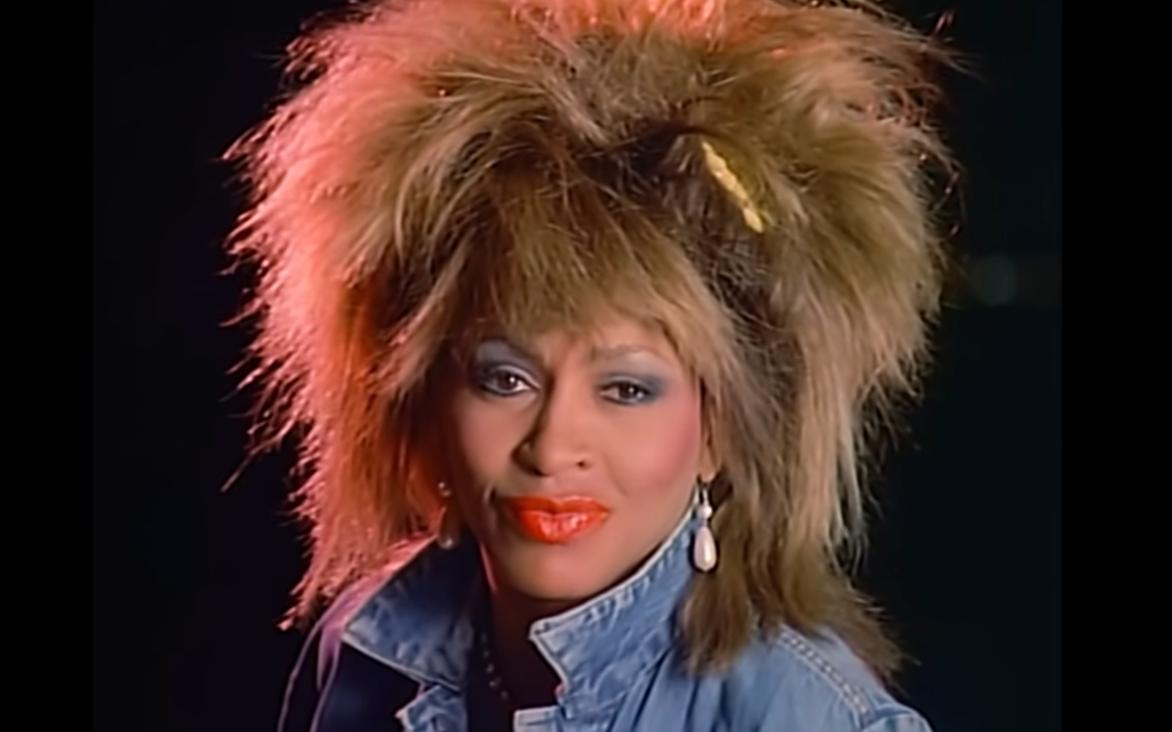
The many acclaimed LGBTQ people and allies who died in 2023 include:
Frank Galati, an internationally acclaimed writer, director, and actor, known for directing “Ragtime” on Broadway and his Chicago theater work, which included his adaptation of “The Grapes of Wrath,” died on Jan. 2 in Sarasota, Fla. at 79 from complications of cancer.
Lily Chavez, a beloved D.C. nightlife figure, died on Jan. 8 at age 35 from complications of Lupus. Chavez was the box office cashier at D.C.’s Town Danceboutique, a bartender at Annie’s and Level 1 restaurants and the gay bar Cobalt, the Blade reported.
Sal Piro, a fan of “The Rocky Horror Picture Show,” who saw the camp classic some 1,300 times and founded “The Rocky Horror Picture Show” fan club, died at 72 on Jan. 22 at his Manhattan home from an aneurysm in his esophagus.
Everett Quinton, an actor, director, and leader of the Ridiculous Theatrical Company after his partner Charles Ludlam’s death in 1987, died on Jan. 23 in Brooklyn, Ny. at 71 from glioblastoma, a fast-moving cancer.
Albert Russell, an acclaimed organist and music director from 1966 to 1984 of St. John’s Episcopal Church on Lafayette Square in D.C. (often called the “Church of the Presidents”), died at 91 from complications of a fall on Jan. 23 at his Washington home.
Dr. Charles Silverstein, a psychologist, whose presentation as a graduate student helped to persuade the American Psychiatric Association to stop pathologizing being queer, died on Jan. 30 at age 87 at his Manhattan home from lung cancer. He founded the Institute for Human Identity, which provides mental health service to LGBTQ clients.
Shinta Ratri, an Indonesian transgender activist, who founded an Islamic boarding school that provides a safe space for trans women, died on Feb. 1 at 60 from a heart attack in Yogyakarta, a city on the Indonesian island of Java.
Adrian Hall, the founding artistic director of the Trinity Repertory Company in Providence, R.I., who revitalized regional theater in Dallas and other cities, died at 95 on Feb. 4 in a hospital in Tyler, Texas.
Donald Spoto, a biographer whose more than two-dozen subjects included Joan of Arc, Jesus, Alfred Hitchcock and Grace Kelly, died at 81 on Feb. 11 in Koege, Denmark from a brain hemorrhage.
Howard Bragman, a publicist who advised celebrities involved in scandals and queer clients who were coming out, died at 66 on Feb. 11 from leukemia in Los Angeles.
John E. Woods, an award-winning translator of Thomas Mann, died on Feb. 15 in Berlin at 80 from a lung ailment and skin cancer.
Royston Ellis, a British Beat poet whose spoken word performances accompanied the Beatles, Jimmy Page and other performers before they became rock stars, died on Feb. 26 at 82 from heart failure in Induruwa, Sri Lanka.
Georgina Beyer, believed to be the first transgender member of Parliament in New Zealand, died on March 6 at 65 in a Wellington, New Zealand hospice.
Ian Falconer, whose popular children’s books featuring Olivia, an endearing, charming pig, delighted kids and adults, died on March 7 at 63 in Norwalk, Conn., from kidney failure.
Julie Anne Peters, author of “Luna,” whose books were widely banned, died on March 21 at 71 at her Wheat Ridge, Colo. home. “Luna,” released in 2004, is believed to be the first young-adult novel with a transgender character to come out from a mainstream publisher.
Walter Cole, the world’s oldest drag performer known as Darcelle XV died March 23 at 92 at a Portland, Ore. hospital.
James Bowman, a British countertenor known for his performance as Oberon in Benjamin Britten’s opera “A Midsummer Night’s Dream” and Apollo in Britten’s opera “Death in Venice,” died at 81 on March 27 at his home in Redhill, south of London.
Raghavan Iyer, an American-born chef and author who introduced Americans to Indian cuisine, died on March 31 at 61 in San Francisco from pneumonia complicated by colorectal cancer that had metastasized to his lungs and brain.
Rachel Pollack, a transgender activist and authority on tarot, who created the first trans DC Comics superheroine, died at 77 on April 7 from non-Hodgkin’s lymphoma in Rhinebeck, N.Y.
Gail Christian, a trailblazing, acclaimed Black NBC News and PBS correspondent, died on April 12 at 83 in Los Angeles from complications of intestinal surgery.
Helen Thorington, a trailblazer in radio and internet art, died at 94 on April 13 from complications of Alzheimer’s disease in Lincoln, Mass.
Koko Da Doll, 35, a Black transgender woman, who was featured in “Kokomo City,” an award-winning documentary about four Black transgender sex workers, was killed in Atlanta on April 18.
Barry Humphries, the Australian-born actor and comic, who created the divine and beloved Dame Edna, died on April 22 in Sydney at 89 several days after having hip surgery.
Robert Patrick, a playwright whose 1964 play “The Haunted Host,” The New York Times has called “a touchstone of early gay theater,” died at 85 on April 23 from atherosclerotic cardiovascular disease at his Los Angeles home.
Harry Belafonte, a barrier-breaking singer, actor, civil rights activist and LGBTQ ally, known as the “King of Calypso,” died on April 25 at 96 from congestive heart failure at his Manhattan home.
David Miranda, an ally of Edward J. Snowden and an advocate for LGBTQ rights in Brazil’s Congress, who was born in the slums of Rio de Janeiro, died at 37 on May 9. He died in a Rio de Janeiro hospital intensive care unit after battling an abdominal infection for nine months.
Renowned queer, avant-garde artist Kenneth Anger, known for his surreal films, died at 96 on May 11 in a care facility in Yucca Valley, Calif. Anger wrote two “Hollywood Babylon” books, which were filled with gossip. These works were thought to be based on rumors, not facts.
Helmut Berger, an Austrian actor who was known for his work in films directed by the acclaimed filmmaker Luchino Visconti, died at 78 on May 18 at his Salzburg home.
Tina Turner, the legendary singer, who performed at the first Gay Games in 1982, died on May 24 at 83 at her home in Kusnacht, Switzerland after a long illness.
George Maharis, an actor who was a star in the iconic TV show “Route 66,” died at 94 on May 24 at his Beverly Hills, Calif. home.
Jon Haggins, a fashion designer, who was acclaimed for, what The New York Times called his “sinuous, sensuous” 1960s and early 70s designs, died on June 15 at 79 at his Queens, N.Y. home.
The drummer for the Texas acid-punk band Butthole Surfers, Teresa Taylor, died at 60 on June 18 from lung cancer. She was beloved by Gen-Xers for her appearance in the 1990 movie “Slacker.”
Robert Black, an acclaimed bassist and a founding member of the renowned Bang on a Can All-Stars ensemble, died at 67 on June 22 from colon cancer at his Hartford, Conn. home.
David Richards, a theater critic, who was a Pulitzer Prize finalist for his work for the The Washington Post, and, briefly, chief drama critic for The New York Times, died at 82 on June 24 in a Warrenton, Va. hospital. The cause of death was complications from Parkinson’s disease.
Michele Judith Ballotta, a.k.a. Mickie, a beloved advocate for the fight against breast cancer and other causes, died on June 24 at age 67 in Seaford, Md.
Lilli Vincenz, a groundbreaking LGBTQ rights activist, psychotherapist and documentary filmmaker, died at 85 on June 27 of natural causes at her residence at an Oakton, Va. assisted living center.
Dr. Susan Love, a surgeon, public health advocate, author, researcher and founder of the National Breast Cancer Coalition, died at 75 on July 2 from a recurrence of leukemia at her Los Angeles home. At the time of her death, she was chief visionary office of the Dr. Susan Love Foundation.
Minnie Bruce Pratt, an acclaimed lesbian poet, essayist and LGBTQ activist, died at 76 from an aggressive brain tumor on July 2 at a hospice in Syracuse, N.Y.
Cheri Pies, author of the landmark 1985 book “Considering Parenthood: A Workbook for Lesbians,” died at 73 from cancer on July 4 at her Berkeley, Calif. home.
The Rev. A. Stephen Pieters, a gay minister, who had AIDS and spoke about being gay and having the disease to church congregations in the 1980s when homophobia was the norm, died at 70 on July 8 from a sepsis infection at a Glendale, Calif. hospital. His memoir “Love Is Greater Than AIDS: A Memoir of Survival, Healing, and Hope” will be released in 2024.
Amos Badertscher, a photographer whose empathetic portraits of hustlers, sex workers and drag queens in Baltimore are in institutions devoted to queer art from the Leslie-Loman Museum of Art in New York to the ONE Archives in Los Angeles, died on July 24. He died in Baltimore at age 86 from complications from a fall.
Sinead O’Connor, the pop singer, who was acclaimed, but reviled for denouncing pedophilia in the Catholic Church, and, in 1992, tearing up a photo of Pope John Paul II on “Saturday Night Live,” died at 56 on July 26.
James “Hawk” Crutchfield, a U.S. Air Force veteran and U.S. Federal Communications Commission career program analyst, died at 77 of natural causes in his D.C. home on July 29. For more than four decades, Crutchfield was “devoted” to volunteer leadership to at least eight D.C.-area LGBTQ D.C. organizations, the Blade reported.
Paul Reubens, the actor and comedian who created and portrayed the iconic and beloved character Pee-Wee Herman, died at 70 on July 30 from cancer in a Los Angeles hospital.
Jess Search, a gender nonconforming producer of documentaries focusing on marginalized groups, died at 54 on July 31 in a London hospital from brain cancer. Search helped to start-up the Doc Society, a group that supports documentarians.
Carmen Xtravaganza, a ballroom legend and transgender activist, who was featured in the documentary “Paris Is Burning,” died at 62 on Aug. 4. Before her death, she had been struggling with stage 4 lung cancer.
Sarah Wunsch, a civil liberties lawyer known for her work on race, gender ,and free speech issues, died at 75 on Aug. 17 at her Brookline, Mass. home from complications of a stroke.
Janne Marie Harrelson, who had a 32-year career at Gallaudet University, died at 70 on Aug. 23 from Ovarian cancer while in hospice care in Rockville, Md. She held multiple leadership positions at Gallaudet, including director, National Mission Planning and director, Gallaudet University Regional Centers.
Michael Leva, an acclaimed 1980s fashion designer, who was on the cover of the (now defunct) weekly “7 Days” for its “Designers on the Verge” feature, and later a prominent fashion executive, died at 62 on Sept. 14 in Providence, R.I. from heart failure.
Erwin Olaf, a Dutch photographer acclaimed for his portraits of counterculture celebs and Dutch royalty died at 64 on Sept. 20 in Groningen, the Netherlands from complications of a lung transplant.
John F. Benton, 72, who worked in management at the Smithsonian Institution’s National Air and Space Museum and other government agencies for more than four decades, died on Sept 20 after a short illness at the Virginia Hospital Center in Arlington the Blade reported.
Pat Arrowsmith, 93, a British author, anti-war activist and Campaign for Nuclear Disarmament co-founder, who worked with Amnesty International, died on Sept. 27 at her North London home.
Rudy Perez, a choreographer and postmodern dance pioneer died at 93 on Sept. 29 from complications of asthma at his Los Angeles home.
Beverly Willis, a trailblazing, acclaimed architect, who advocated for omen striving to break through in the profession, died at 95 on Oct. 1 from complications of Parkinson’s disease at her Branford, Conn., home.
James Jorden, a writer and creator of the high culture, yet punk opera zine-turned-website Parterre Box, died at 69 on Oct. 2. He was found dead at his Sunnyside, Queens home, The New York Times reported.
Terence Davies, 77, a British director whose acclaimed films included “The House of Mirth,” “A Quiet Passion” and “Benediction,” died on Oct. 7, after what his manager said was “a short illness,” at his home in Mistley, Essex in England.
Margot Polivy, a lawyer, champion of women in college sports and a tireless advocate for Title IX, died at 85 on Oct. 7 at her Washington home.
Steven Lutvak, 64, a composer and lyricist whose show “A Gentleman’s Guide to Love & Murder” won the Tony Award for best musical, died on Oct. 9 from a pulmonary embolism at his Manhattan work studio.
Eva Kollisch, 98, in her teens, fled Nazi-occupied Austria. Kollisch, who grew up to be a prominent lesbian rights advocate, feminist studies scholar and memoirist, died from a chest infection on Oct. 10 at her Manhattan home.
Jack Anderson, a dance critic for The New York Times for five decades, died at 88 in a New York City hospital from sepsis on Oct. 20.
Amber Hollibaugh, 77, an activist, organizer, author of “My Dangerous Desires: A Queer Girl Dreaming Her Way Home” and self-educated public intellectual in the LGBTQ+, feminist, sexual liberation and economic justice movements, died from complications of diabetes on Oct. 20, the Blade reported.
David Del Tredici, a Pulitzer Prize-winning composer, acclaimed for his pieces that set parts of “Alice in Wonderland” to music, died at 86 from Parkinson’s disease on Nov. 18 at his Greenwich Village home.
Carlton D. Pearson, a pastor who was cast aside by his evangelical megachurch after he said he didn’t believe in hell and began advocating for LGBTQ+ rights, died at 70 on Nov. 19 from cancer in a Tulsa, Okla. hospice. Pearson, whose life story was told in a Netflix movie, moved on from his evangelical church to become a minister with the United Church of Christ, a liberal Christian denomination.
Brandon “RBC” Gordon, 41, a Greenbelt City Council member, who started the Greenbelt Pride festival in 2022, died on Nov. 26. Gordon, who worked to make the community more inclusive, identified as a “transamorous heterosexual man,” The Washington Post, reported.
LGBTQ ally Norman Lear, the TV writer and producer whose TV shows, from “All in the Family” to “Maude,” transformed the culture, died at 101 on Dec. 5 at his Los Angeles home.
a&e features
Eastern Shore chef named James Beard Finalist
Harley Peet creates inventive food in an inclusive space

In a small Eastern Shore town filled with boutiques, galleries, and the occasional cry of waterfowl from the Chesapeake, Chef Harley Peet is most at home. In his Viennese-inflected, Maryland-sourced fine-dining destination Bas Rouge, Peet draws from his Northern Michigan upbringing, Culinary Institute of America education, and identity as a gay man, for inspiration.
And recently, Peet was named a James Beard Finalist for Best Chef: Mid-Atlantic – the first “Best Chef: Mid-Atlantic” finalist representing the Eastern Shore.
Peet, after graduation from the Culinary Institute of America, took a position as sous chef at Tilghman Island Inn, not far from Bas Rouge. Falling in love with the Eastern Shore, he continued his passion for racing sailboats, boating, gardening, and fishing, and living his somewhat pastoral life as he opened Bas Rouge in 2016 as head chef, a restaurant part of the Bluepoint Hospitality group, which runs more than a dozen concepts in and around Easton, Md.
Coming from a rural area and being gay, Peet knew he had his work cut out for him. He was always aware that the service and hospitality industry “can be down and dirty and rough.”
Now as a leader in the kitchen, he aims to “set a good example, and treat people how I want to be treated. I also want to make sure if you’re at our establishment, I’m the first to stand up and say something.”
The Bas Rouge cuisine, he says, is Contemporary European. “I’m inspired by old-world techniques of countries like Austria, Germany, and France, but I love putting a new spin on classic dishes and finding innovative ways to incorporate the bounty of local Chesapeake ingredients.”
His proudest dish: the humble-yet-elevated Wiener Schnitzel. “It is authentic to what one would expect to find in Vienna, down to the Lingonberries.” From his in-house bakery, Peet dries and grinds the housemade Kaiser-Semmel bread to use as the breadcrumbs.
Peet works to support the LGBTQ community inside and outside of the kitchen. “I love that our Bluepoint Hospitality team has created welcoming spaces where our patrons feel comfortable dining at each of our establishments. Our staff have a genuine respect for one another and work together free of judgment.”
Representing Bluepoint, Peet has participated in events like Chefs for Equality with the Human Rights Campaign, advocating for LGBTQ rights.
At Bas Rouge, Peet brings together his passion for inclusion steeped in a sustainability ethic. He sees environmental stewardship as a way of life. Peet and his husband have lived and worked on their own organic farm for several years. Through research in Europe, he learned about international marine sourcing. Witnessing the impacts of overfishing, Peet considers his own role in promoting eco-friendly practices at Bas Rouge. To that end, he ensures responsible sourcing commitments through his purveyors, relationships that have helped create significant change in how people dine in Easton.
“I have built great relationships in the community and there’s nothing better than one of our long-standing purveyors stopping in with a cooler of fresh fish from the Chesapeake Bay. This goes especially for catching and plating the invasive blue catfish species, which helps control the species’ threat to the local ecosystem.
Through his kitchen exploits, Peet expressed a unique connection to another gay icon in a rural fine-dining restaurant: Patrick O’Connell, of three Michelin starred Inn at Little Washington. In fact, Peet’s husband helped design some of O’Connell’s kitchen spaces. They’ve both been able to navigate treacherous restaurant-industry waters, and have come out triumphant and celebrated. Of O’Connell, Peet says that he “sees [his restaurants] as canvas, all artistry, he sees this as every night is a show.” But at the same time, his “judgment-free space makes him a role model.”
Being in Easton itself is not without challenges. Sourcing is a challenge, having to either fly or ship in ingredients, whereas urban restaurants have the benefit of trucking, he says. The small town “is romantic and charming,” but logistics are difficult – one of the reasons that Peet ensures his team is diverse, building in different viewpoints, and also “making things a hell of a lot more fun.”
Reflecting on challenges and finding (and creating) space on the Eastern Shore, Peet confirmed how important it was to surround himself with people who set a good example, and “if you don’t like the way something is going … move on.”
a&e features
What to expect at the 2024 National Cannabis Festival
Wu-Tang Clan to perform; policy discussions also planned

(Editor’s note: Tickets are still available for the National Cannabis Festival, with prices starting at $55 for one-day general admission on Friday through $190 for a two-day pass with early-entry access. The Washington Blade, one of the event’s sponsors, will host a LGBTQIA+ Lounge and moderate a panel discussion on Saturday with the Mayor’s Office of LGBTQ Affairs.)
With two full days of events and programs along with performances by Wu-Tang Clan, Redman, and Thundercat, the 2024 National Cannabis Festival will be bigger than ever this year.
Leading up to the festivities on Friday and Saturday at Washington, D.C.’s RFK Stadium are plenty of can’t-miss experiences planned for 420 Week, including the National Cannabis Policy Summit and an LGBTQ happy hour hosted by the District’s Black-owned queer bar, Thurst Lounge (both happening on Wednesday).
On Tuesday, the Blade caught up with NCF Founder and Executive Producer Caroline Phillips, principal at The High Street PR & Events, for a discussion about the event’s history and the pivotal political moment for cannabis legalization and drug policy reform both locally and nationally. Phillips also shared her thoughts about the role of LGBTQ activists in these movements and the through-line connecting issues of freedom and bodily autonomy.
After D.C. residents voted to approve Initiative 71 in the fall of 2014, she said, adults were permitted to share cannabis and grow the plant at home, while possession was decriminalized with the hope and expectation that fewer people would be incarcerated.
“When that happened, there was also an influx of really high-priced conferences that promised to connect people to big business opportunities so they could make millions in what they were calling the ‘green rush,'” Phillips said.
“At the time, I was working for Human Rights First,” a nonprofit that was, and is, engaged in “a lot of issues to do with world refugees and immigration in the United States” — so, “it was really interesting to me to see the overlap between drug policy reform and some of these other issues that I was working on,” Phillips said.
“And then it rubbed me a little bit the wrong way to hear about the ‘green rush’ before we’d heard about criminal justice reform around cannabis and before we’d heard about people being let out of jail for cannabis offenses.”
“As my interests grew, I realized that there was really a need for this conversation to happen in a larger way that allowed the larger community, the broader community, to learn about not just cannabis legalization, but to understand how it connects to our criminal justice system, to understand how it can really stimulate and benefit our economy, and to understand how it can become a wellness tool for so many people,” Phillips said.
“On top of all of that, as a minority in the cannabis space, it was important to me that this event and my work in the cannabis industry really amplified how we could create space for Black and Brown people to be stakeholders in this economy in a meaningful way.”

“Since I was already working in event production, I decided to use those skills and apply them to creating a cannabis event,” she said. “And in order to create an event that I thought could really give back to our community with ticket prices low enough for people to actually be able to attend, I thought a large-scale event would be good — and thus was born the cannabis festival.”
D.C. to see more regulated cannabis businesses ‘very soon’
Phillips said she believes decriminalization in D.C. has decreased the number of cannabis-related arrests in the city, but she noted arrests have, nevertheless, continued to disproportionately impact Black and Brown people.
“We’re at a really interesting crossroads for our city and for our cannabis community,” she said. In the eight years since Initiative 71 was passed, “We’ve had our licensed regulated cannabis dispensaries and cultivators who’ve been existing in a very red tape-heavy environment, a very tax heavy environment, and then we have the unregulated cannabis cultivators and cannabis dispensaries in the city” who operate via a “loophole” in the law “that allows the sharing of cannabis between adults who are over the age of 21.”
Many of the purveyors in the latter group, Phillips said, “are looking at trying to get into the legal space; so they’re trying to become regulated businesses in Washington, D.C.”
She noted the city will be “releasing 30 or so licenses in the next couple of weeks, and those stores should be coming online very soon” which will mean “you’ll be seeing a lot more of the regulated stores popping up in neighborhoods and hopefully a lot more opportunity for folks that are interested in leaving the unregulated space to be able to join the regulated marketplace.”
National push for de-scheduling cannabis
Signaling the political momentum for reforming cannabis and criminal justice laws, Wednesday’s Policy Summit will feature U.S. Sens. Raphael Warnock (D-Ga.), Jeff Merkley (D-Ore.), Elizabeth Warren (D-Mass.), and Chuck Schumer (D-N.Y.), the Senate majority leader.
Also representing Capitol Hill at the Summit will be U.S. Congresswoman Eleanor Holmes Norton (D-D.C.) and U.S. Reps. Earl Blumenauer (D-Ore.) and Barbara Lee (D-Calif.) — who will be receiving the Supernova Women Cannabis Champion Lifetime Achievement Award — along with an aide to U.S. Rep. David Joyce (R-Ohio).
Nationally, Phillips said much of the conversation around cannabis concerns de-scheduling. Even though 40 states and D.C. have legalized the drug for recreational and/or medical use, marijuana has been classified as a Schedule I substance since the Controlled Substances Act was passed in 1971, which means it carries the heftiest restrictions on, and penalties for, its possession, sale, distribution, and cultivation.
The U.S. Department of Health and Human Services formally requested the drug be reclassified as a Schedule III substance in August, which inaugurated an ongoing review, and in January a group of 12 Senate Democrats sent a letter to the Biden-Harris administration’s Drug Enforcement Administration urging the agency to de-schedule cannabis altogether.
Along with the Summit, Phillips noted that “a large contingent of advocates will be coming to Washington, D.C. this week to host a vigil at the White House and to be at the festival educating people” about these issues. She said NCF is working with the 420 Unity Coalition to push Congress and the Biden-Harris administration to “move straight to de-scheduling cannabis.”
“This would allow folks who have been locked up for cannabis offenses the chance to be released,” she said. “It would also allow medical patients greater access. It would also allow business owners the chance to exist without the specter of the federal government coming in and telling them what they’re doing is wrong and that they’re criminals.”
Phillips added, however, that de-scheduling cannabis will not “suddenly erase” the “generations and generations of systemic racism” in America’s financial institutions, business marketplace, and criminal justice system, nor the consequences that has wrought on Black and Brown communities.
An example of the work that remains, she said, is making sure “that all people are treated fairly by financial institutions so that they can get the funding for their businesses” to, hopefully, create not just another industry, but “really a better industry” that from the outset is focused on “equity” and “access.”
Policy wonks should be sure to visit the festival, too. “We have a really terrific lineup in our policy pavilion,” Phillips said. “A lot of our heavy hitters from our advocacy committee will be presenting programming.”
“On Saturday there is a really strong federal marijuana reform panel that is being led by Maritza Perez Medina from the Drug Policy Alliance,” she said. “So that’s going to be a terrific discussion” that will also feature “representation from the Veterans Cannabis Coalition.”
“We also have a really interesting talk being led by the Law Enforcement Action Partnership about conservatives, cops, and cannabis,” Phillips added.
Cannabis and the LGBTQ community
“I think what’s so interesting about LGBTQIA+ culture and the cannabis community are the parallels that we’ve seen in the movements towards legalization,” Phillips said.
The fight for LGBTQ rights over the years has often involved centering personal stories and personal experiences, she said. “And that really, I think, began to resonate, the more that we talked about it openly in society; the more it was something that we started to see on television; the more it became a topic in youth development and making sure that we’re raising healthy children.”
Likewise, Phillips said, “we’ve seen cannabis become more of a conversation in mainstream culture. We’ve heard the stories of people who’ve had veterans in their families that have used cannabis instead of pharmaceuticals, the friends or family members who’ve had cancer that have turned to CBD or THC so they could sleep, so they could eat so they could get some level of relief.”
Stories about cannabis have also included accounts of folks who were “arrested when they were young” or “the family member who’s still locked up,” she said, just as stories about LGBTQ people have often involved unjust and unnecessary suffering.
Not only are there similarities in the socio-political struggles, Phillips said, but LGBTQ people have played a central role pushing for cannabis legalization and, in fact, in ushering in the movement by “advocating for HIV patients in California to be able to access cannabis’s medicine.”
As a result of the queer community’s involvement, she said, “the foundation of cannabis legalization is truly patient access and criminal justice reform.”
“LGBTQIA+ advocates and cannabis advocates have managed to rein in support of the majority of Americans for the issues that they find important,” Phillips said, even if, unfortunately, other movements for bodily autonomy like those concerning issues of reproductive justice “don’t see that same support.”
a&e features
Juliet Hawkins’s music defies conventional categorization
‘Keep an open mind, an open heart, and a willingness to evolve’
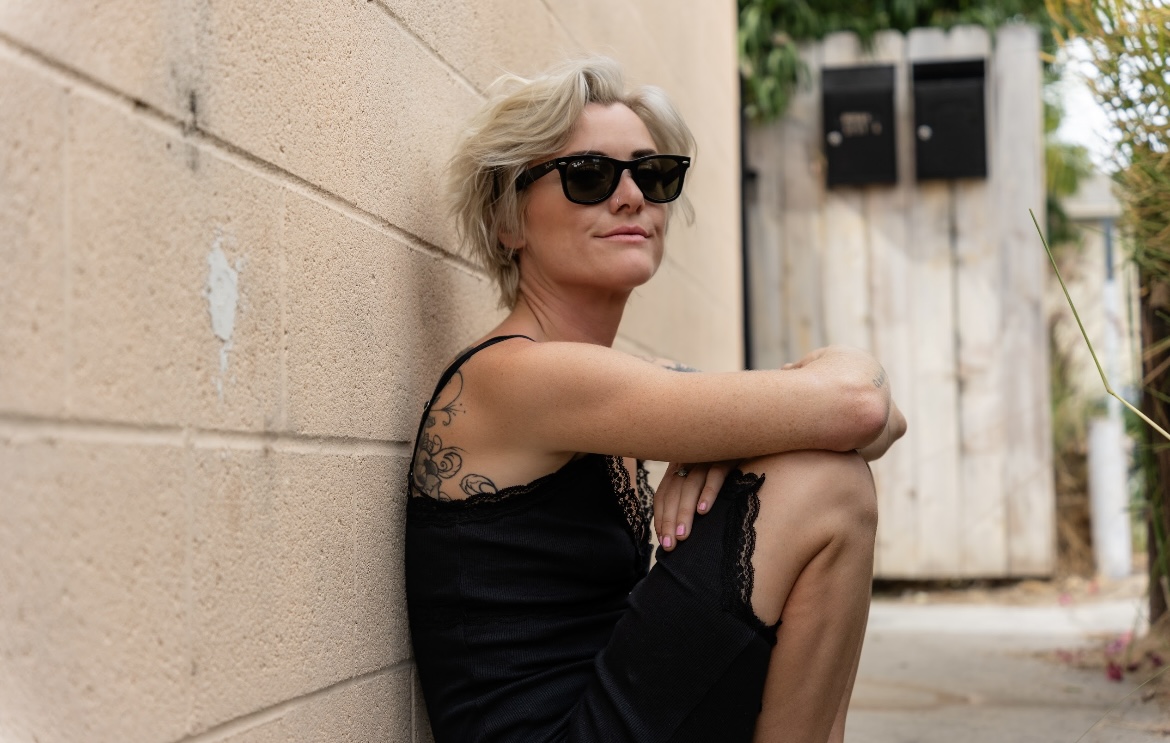
LONG BEACH, Calif. – Emerging from the dynamic music scene of Los Angeles, Juliet Hawkins seamlessly integrates deeply soulful vocals with contemporary production techniques, crafting a distinctive sound that defies conventional categorization.
Drawing inspiration from the emotive depth of Amy Winehouse and weaving together elements of country, blues, and pop, Hawkins’ music can best be described as a fusion–perhaps best termed as soulful electronica. Yet, even this characterization falls short, as Hawkins defines herself as “a blend of a million different inspirations.”
Hawkins’s musical palette mirrors her personae: versatile and eclectic. Any conversation with Hawkins makes this point abundantly clear. She exhibits the archetype of a wild, musical genius while remaining true to her nature-loving, creative spirit. Whether recording in the studio for an album release, performing live in a studio setting, or playing in front of a live audience, Hawkins delivers her music with natural grace.
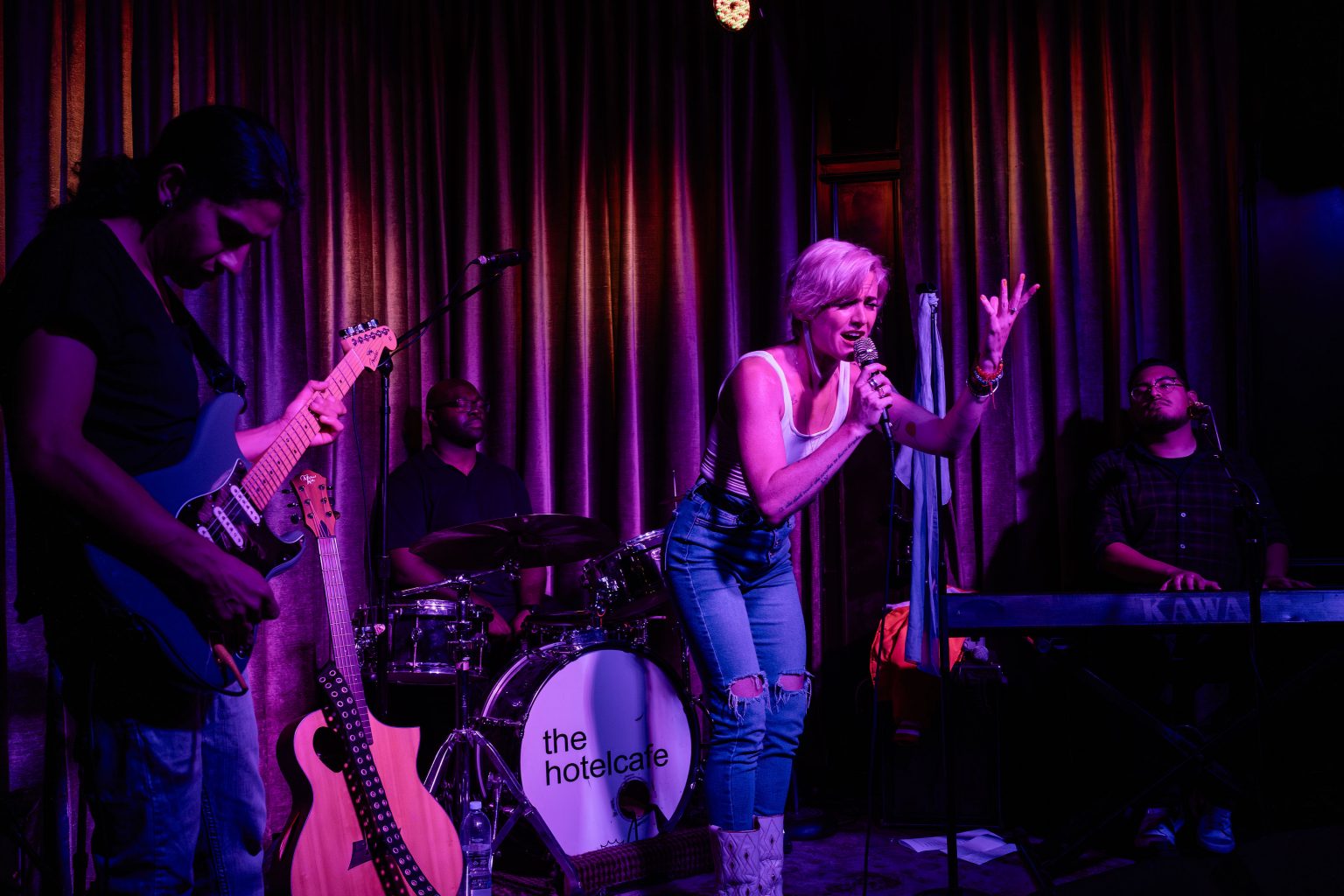
However, Hawkins’s musical journey is far from effortless. Amid personal challenges and adversity, she weaves her personal odyssey of pain and pleasure, transforming these experiences into empowering anthems.
In a candid interview with the Blade, Hawkins spoke with profound openness and vulnerability about her past struggles with opiate and heroin addiction: “That was 10 years ago that I struggled with opiates,” she shared. Yet, instead of letting her previous addiction define her, Hawkins expressed to the Blade that she harbors no shame about her past. “My newer music is much more about empowerment than recovery,” she explained, emphasizing that “writing was the best way to process trauma.”
Despite her struggles with addiction, Hawkins managed to recover. However, she emphasizes that this recovery is deeply intertwined with her spiritual connection to nature. An illustrative instance of Hawkins’ engagement with nature occurred during the COVID pandemic.
Following an impulse that many of us have entertained, she bought a van and chose to live amidst the trees. It was during this period that Hawkins composed the music for her second EP, titled “Lead with Love.”
In many ways, Hawkins deep spiritual connection to nature has been profoundly shaped by her extensive travels. Born in San Diego, spending her formative years in Massachusetts, and later moving to Tennessee before returning to Southern California, she has broadened her interests and exposed herself to the diverse musical landscapes across America.
“Music is the only thing I have left,” Hawkins confides to the Blade, highlighting the integral role that music has in her life. This intimate relationship with music is evident in her sultry and dynamic compositions. Rather than imitating or copying other artists, Hawkins effortlessly integrates sounds from some of her favorite musical influences to create something new. Some of these influences include LP, Lucinda Williams, Lana Del Rey, and, of course, Amy Winehouse, among others.

Hawkins has always been passionate about music—-she began with piano at a young age, progressed to guitar, and then to bass, eagerly exploring any instrument she could get her hands on. However, instead of following a traditional path of formalized lessons and structured music theory, Hawkins told the Blade that she “has a hard time following directions and being told what to do.”
This independent approach has led her to experiment with various genres and even join unexpected groups, such as a tribute band for Eric Clapton and Cream. While she acknowledges that her eclectic musical interests might be attributed to ADHD, she holds a different belief: “Creative minds like to move around.”
When discussing her latest musical release — “Stay True (the live album)” which was recorded in a live studio setting — Hawkins describes the experience as a form of improvisation with both herself and the band:
“[The experience] was this divine honey that was flowing through all of us.” She explains that this live album was uncertain in the music’s direction. “For a couple of songs,” Hawkins recalls, “we intuitively closed them out.” By embracing creative spontaneity and refusing to be constrained by fear of mistakes, the live album authentically captures raw sound, complete with background chatter, extended outros, and an extremely somber cover of Ozzy Osbourne’s “Crazy Train” coupled with a slow piano and accompanied strings.
While “Stay True” was a rewarding experience for Hawkins, her favorite live performance took place in an unexpected location—an unattended piano in the middle of an airport. As she began playing Beethoven’s “Moonlight Sonata”, Hawkins shared with the Blade a universal connection we all share with music: “This little girl was dancing as I was playing.”
After the performance, tears welled in Hawkins’ eyes as she was touched by the young girl’s appreciation of her musicianship. Hawkins tells the Blade, “It’s not about playing to an audience—it’s about finding your people.”
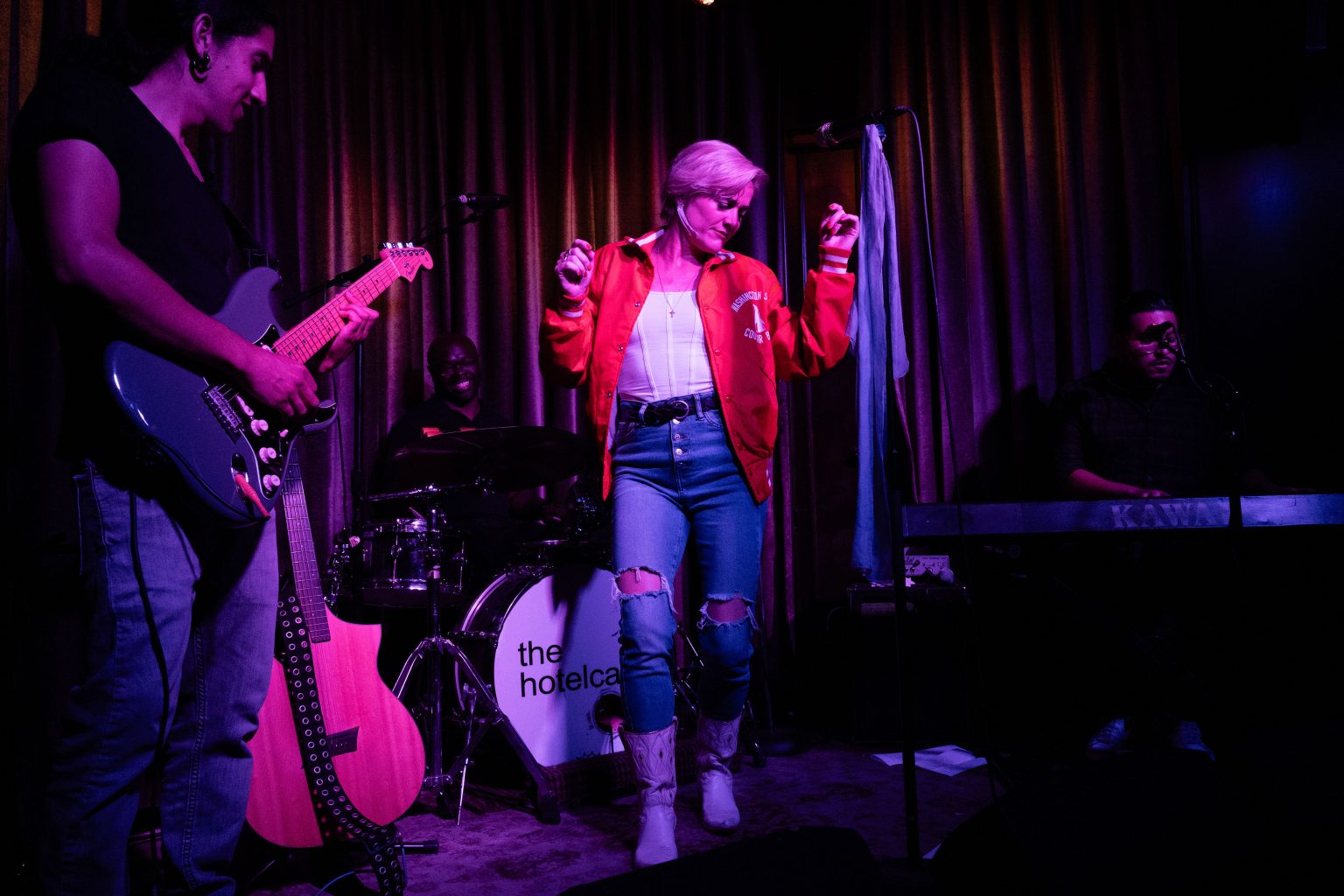
What sets Hawkins apart as an artist is her ability to connect with her audience in diverse settings. She highlights EDC, an electronic dance music festival, as a place where she unabashedly lets her “freak flag” fly and a place to connect with her people. Her affinity for electronic music not only fuels her original pop music creations, but also inspires her to reinterpret songs with an electronic twist. A prime example of this is with her electronic-style cover of Tal Bachman’s 90’s hit, “She’s So High.”
As an openly queer woman in the music industry, Hawkins is on a mission to safeguard artistic integrity. In songs like “My Father’s Men,” she bares her vulnerability and highlights the industry’s misogyny, which often marginalizes gender minorities in their pursuit of artistic expression.
She confides to the Blade, “The industry can be so sexist, misogynist, and oppressive,” and points out that “there are predators in the industry.” Yet, rather than succumbing to apathy, Hawkins is committed to advocating for gender minorities within the music industry.
“Luckily, people are rising up against misogyny, but it’s still there. ‘My Father’s Men’ is a message: It’s time for more people who aren’t just white straight men to have a say.”
Hawkins is also an activist for other causes, with a fervent belief in the preservation of bodily autonomy. Her self-directed music video “I’ll play Daddy,” showcases the joy of embracing one’s body with Hawkins being sensually touched by a plethora of hands. While the song, according to Hawkins, “fell upon deaf ears in the south,” it hasn’t stopped Hawkins from continuing to fight for the causes she believes in. In her interview, Hawkins encapsulated her political stance by quoting an artist she admires:
“To quote Pink, ‘I don’t care about your politics, I care about your kids.’”
When Hawkins isn’t writing music or being a champion for various causes, you might catch her doing the following: camping, rollerblading, painting, teaching music lessons, relaxing with Bernie (her beloved dog), stripping down for artsy photoshoots, or embarking on a quest to find the world’s best hollandaise sauce.
But at the end of the day, Hawkins sums up her main purpose: “To come together with like-minded people and create.”
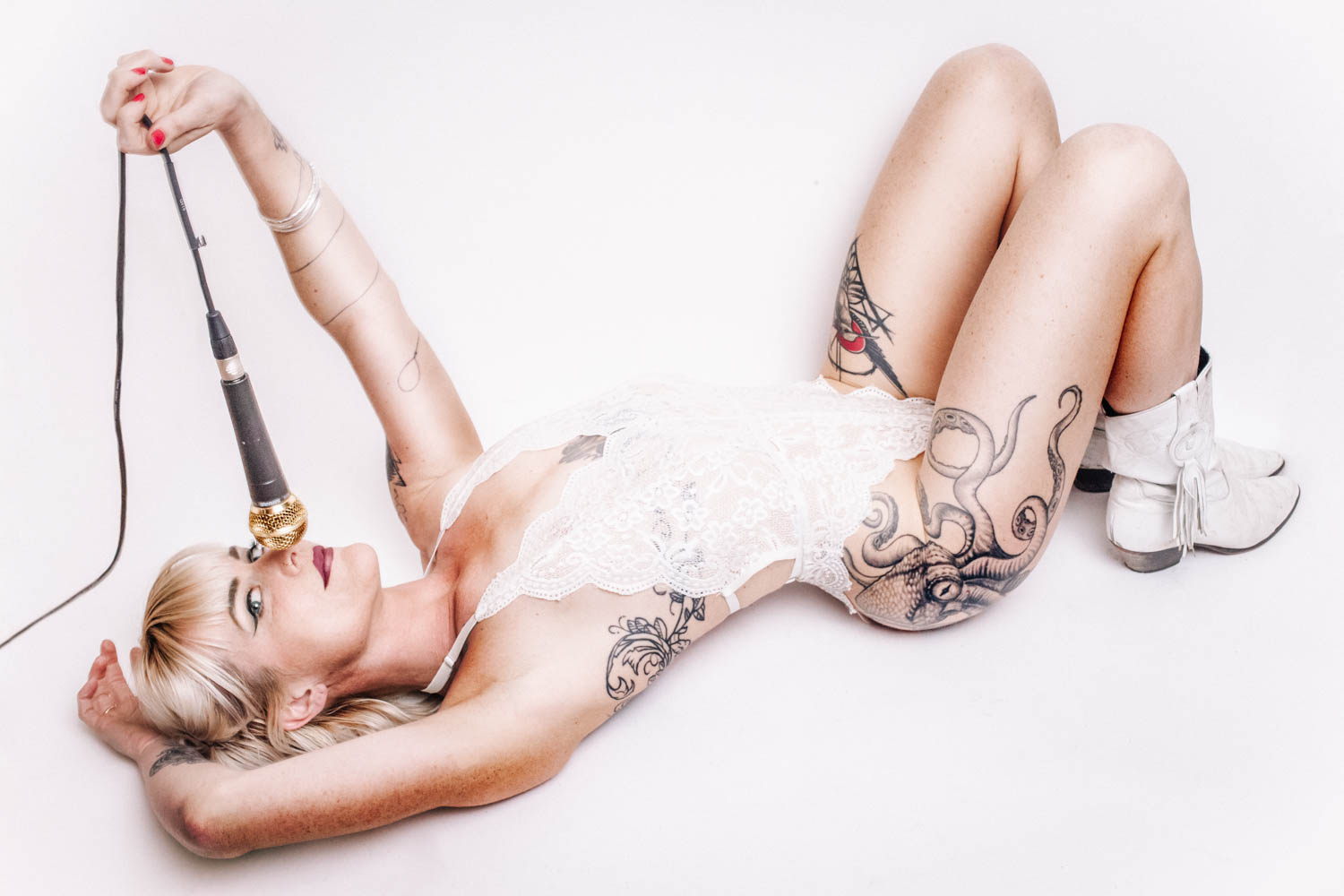
Part of this ever-evolving, coming-of-age-like journey includes an important element: plant-based medicine. Hawkins tells the Blade that she acknowledges her previous experience with addiction and finds certain plants to be useful in her recovery:
“The recovery thing is tricky,” Hawkins explains, “I don’t use opiates—-no powders and no pills—but I am a fan of weed, and I think psilocybin can be helpful when used at the right time.” She emphasizes the role of psychedelics in guiding her towards her purpose. “Thanks for psychedelics, I have a reignited sense of purpose … Music came naturally to me as an outlet to heal.”
While she views the occasional dabbling of psychedelics as a spiritual practice, Hawkins also embraces other rituals, particularly those she performs before and during live shows. “I always carry two rocks with me: a labradorite and a tiger’s eye marble,” she explains.
-

 State Department4 days ago
State Department4 days agoState Department releases annual human rights report
-

 South America2 days ago
South America2 days agoArgentina government dismisses transgender public sector employees
-

 District of Columbia2 days ago
District of Columbia2 days agoCatching up with the asexuals and aromantics of D.C.
-

 Politics4 days ago
Politics4 days agoSmithsonian staff concerned about future of LGBTQ programming amid GOP scrutiny












